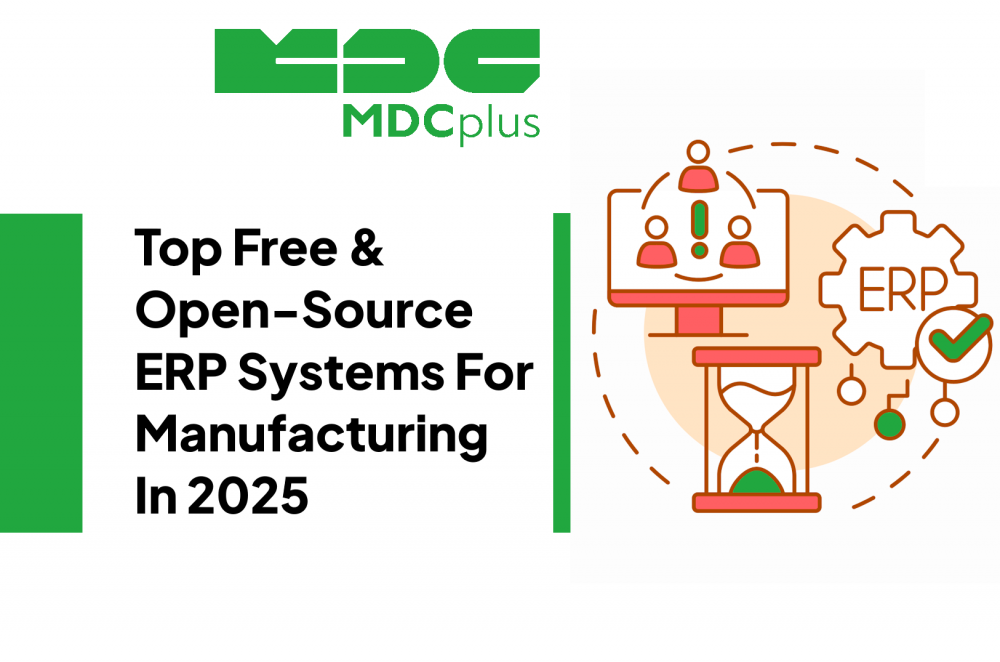Top Free & Open-Source ERP Systems for Manufacturing In 2025
Enterprise Resource Planning (ERP) systems bring together production, finance, procurement, and inventory into one integrated framework. For manufacturers, open-source ERP solutions offer flexibility, control over data, and lower entry costs compared to proprietary platforms. These systems can serve as a foundation for digital transformation, connecting MES, CMMS, and APS layers under one environment.
1. ERPNext
Best for: full-stack open-source ERP with mature manufacturing module.
ERPNext is one of the most complete open-source ERP systems available. It covers production planning, BOM management, work orders, inventory, accounting, and HR. Built on the Frappe framework (Python + MariaDB), it supports on-prem and cloud deployment. Its manufacturing module includes MRP, routing, and capacity planning. Large global community and documentation make it a strong long-term choice.
2. Odoo Community Edition
Best for: modular ERP with extensive app ecosystem.
Odoo CE offers over 30 official modules, including manufacturing, MRP, quality, and maintenance. It’s ideal for organizations that want to grow from basic ERP to full manufacturing suite without licensing barriers. Built with Python and PostgreSQL, it integrates easily with MES or IoT platforms. The enterprise edition adds analytics and automation, but the community version is powerful enough for SMEs.
3. Dolibarr ERP & CRM
Best for: lightweight ERP/CRM with manufacturing add-ons.
Dolibarr provides core business management with optional modules for manufacturing, inventory, and sales. It’s simple, web-based, and runs on PHP/MySQL, making it easy to deploy. While not a full MRP, its modularity and open API make it suitable for small production businesses.
4. Axelor Open Suite
Best for: enterprises needing customizable BPM + ERP.
Axelor combines ERP, CRM, and BPM into one open-source platform. It supports manufacturing orders, planning, BOMs, and workflows with a Java-based backend. The BPM component allows automation of complex approval or production processes without coding.
5. Tryton
Best for: developers wanting a stable, modular ERP framework.
Tryton is a Python-based ERP with a clear modular architecture. It includes modules for production, inventory, accounting, and purchasing. The focus is on clean design and long-term maintainability, making it excellent for custom ERP builds.
6. Metasfresh ERP
Best for: mid-size manufacturers requiring modern UI and open-core structure.
Metasfresh is based on the former ADempiere codebase but rebuilt for scalability and performance. It supports production planning, materials management, and procurement. It’s free and open-source with optional enterprise support.
7. iDempiere
Best for: enterprises seeking proven open ERP with manufacturing heritage.
iDempiere evolved from Compiere/ADempiere and remains one of the most robust Java-based ERPs. It offers deep MRP, workflow management, and multi-organization control. A strong choice for large factories or distributors.
8. inoERP
Best for: users familiar with Oracle-style ERP systems.
inoERP is an open-source ERP inspired by Oracle E-Business Suite. It supports manufacturing, purchasing, and inventory with clear data models and REST APIs. Built with PHP and PostgreSQL, it’s good for those migrating from legacy Oracle systems.
9. BlueSeer ERP
Best for: small manufacturers and machine shops.
BlueSeer is a 100% free Windows-based ERP system designed for manufacturing and distribution. It includes production control, inventory, sales, and accounting. Although the UI is dated, it’s actively maintained and completely offline-capable.
10. OpenPro ERP
Best for: legacy manufacturers seeking web-based ERP with production modules.
OpenPro combines manufacturing, inventory, and accounting with open architecture. It runs on PHP/MySQL and is used in traditional industries. While older in design, it provides a broad range of features for small to mid-size factories.
Comparison Table
| Platform | Stack | License | Manufacturing Support | Community Activity | Complexity |
|---|---|---|---|---|---|
| ERPNext | Python / MariaDB | GPLv3 | Full MRP, BOM, routing | Very High | Medium |
| Odoo CE | Python / PostgreSQL | LGPLv3 | Modular MRP + quality | Very High | Low |
| Dolibarr | PHP / MySQL | GPLv3 | Basic manufacturing | High | Low |
| Axelor | Java / PostgreSQL | AGPLv3 | BPM + production | Medium | Medium |
| Tryton | Python / PostgreSQL | GPLv3 | Modular production | Medium | Medium |
| Metasfresh | Java / PostgreSQL | GPLv3 | MRP, inventory, costing | Medium | High |
| iDempiere | Java / PostgreSQL | GPLv2 | Full MRP, workflows | Medium | High |
| inoERP | PHP / PostgreSQL | GPLv3 | Oracle-style manufacturing | Low | Medium |
| BlueSeer | Java / Derby | GPLv3 | Discrete manufacturing | Medium | Low |
| OpenPro | PHP / MySQL | Proprietary open | Manufacturing + finance | Low | Medium |
Recommendations
For manufacturers seeking full open-source ERP with proven manufacturing capability, ERPNext and Odoo CE remain the strongest choices. Both are active, well-documented, and can integrate easily with MES, CMMS, and APS.
For developers or integrators who want control and extensibility, Tryton and Axelor offer cleaner architectures with less vendor lock-in. If you prefer Java ecosystems, iDempiere and Metasfresh bring industrial-grade MRP depth.
For smaller factories or legacy operations, Dolibarr and BlueSeer are pragmatic — lightweight, quick to install, and easier to maintain.
Open-source ERP systems for manufacturing have matured beyond accounting tools. In 2025, platforms like ERPNext and Odoo CE bridge operations, planning, and finance for factories of any size. Combined with MES and CMMS tools such as MDCplus, they form the backbone of a transparent, data-driven production environment.
About MDCplus
Our key features are real-time machine monitoring for swift issue resolution, power consumption tracking to promote sustainability, computerized maintenance management to reduce downtime, and vibration diagnostics for predictive maintenance. MDCplus's solutions are tailored for diverse industries, including aerospace, automotive, precision machining, and heavy industry. By delivering actionable insights and fostering seamless integration, we empower manufacturers to boost Overall Equipment Effectiveness (OEE), reduce operational costs, and achieve sustainable growth along with future planning.
Ready to increase your OEE, get clearer vision of your shop floor, and predict sustainably?
